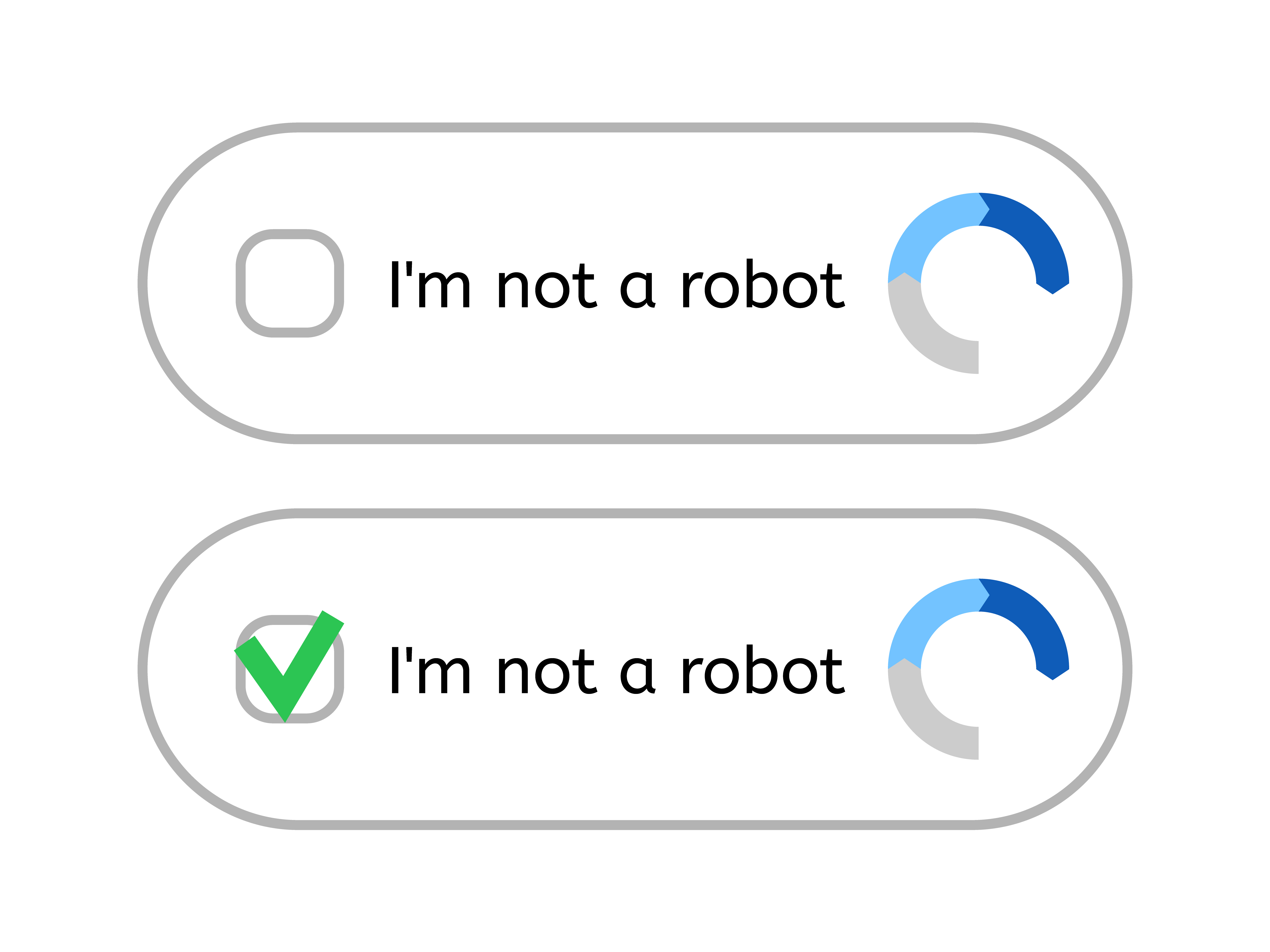In the age of technology the fight against online threats is intensifying, with CAPTCHA tools playing a crucial role in safeguarding websites from automated bots. HCaptcha and reCAPTCHA are leading the charge, in differentiating between human users and harmful automated programs. This detailed comparison aims to inform both tech enthusiasts and web developers about the intricacies of these tools exploring their features, uses, benefits and significance in todays web security environment.
What are the different types of CAPTCHAs?
CAPTCHA technology has advanced to encompass a range of tasks aimed at verifying that users are indeed human. These include:
Text CAPTCHAs
Text CAPTCHAs are those distorted letters and numbers that pop up and make you prove you’re not a robot. They were one of the types of CAPTCHAs created to outsmart bots with their limited ability to recognize text back in the day. Picture this; when you’re signing up for something you might come across a Text CAPTCHA that shows jumbled up characters like “B3nF2 ” and you have to type it correctly into a box.
While they used to be pretty good, at stopping bots as technology improved OCR tech, Text CAPTCHAs aren’t as foolproof as they used to be. This led to the creation of advanced types of CAPTCHAs over time.
Checkboxes (“I am not a robot”)
The Checkbox CAPTCHA, famously known by Google’s reCAPTCHA as the “I am not a robot” checkbox, offers a user-friendly security measure. This CAPTCHA type relies on user interaction data, such as mouse movements and clicking patterns, to differentiate between human users and bots.
A practical application is seen on login pages, where users simply click a checkbox to proceed, significantly improving the user experience by minimizing the effort required to pass the CAPTCHA test.

Image-based CAPTCHAs
Image based CAPTCHAs require users to pick out images from a group like selecting all photos showing traffic lights or storefronts. These tests rely on humans skill, in spotting patterns and classifying images effortlessly a task that proves much harder for automated programs.
For instance online survey forms often use CAPTCHAs to safeguard against bots prompting participants to solve an image based challenge before submitting their answers to ensure only real users can participate.
Audio CAPTCHAs
Audio CAPTCHAs offer an option for individuals facing challenges with visual CAPTCHAs, especially those, with visual impairments. Users are tasked with listening to an audio recording featuring numbers or letters and then transcribing the content they hear.
One practical use of Audio CAPTCHAs is observed on banking platforms, where they act as an alternative authentication measure enabling impaired users to securely log into their accounts.
Sliders
Slider CAPTCHAs involve users in a engaging activity; moving a slider to a certain spot on the screen or solving a puzzle. This approach merges ease of use, with bot prevention by demanding spatial awareness and mouse dexterity that bots usually lack. E commerce sites frequently utilize Slider CAPTCHAs at checkout to thwart automated buying endeavors bolstering security without compromising the shopping journey.
3D CAPTCHAs
3D CAPTCHAs pose a challenge by tasking users with recognizing or adjusting three dimensional objects. This form of CAPTCHA is crafted to be more difficult for automated bots to crack because of the nature of 3D visualization and engagement.
For instance it might involve a 3D representation of an object that users need to rotate to align with an orientation, commonly seen on websites handling important transactions or confidential data to bolster security measures.
Math CAPTCHAs
Math CAPTCHAs pose a simple arithmetic problem, such as addition or subtraction, that the user must solve. This CAPTCHA type plays on the universal understanding of basic math, which is straightforward for humans but introduces an additional hurdle for automated scripts. For instance, a blog comment section might employ Math CAPTCHAs to prevent spam, asking users to solve a basic math question before submitting their comment, thereby filtering out automated spam bots.
By exploring these CAPTCHA types through practical examples, we can appreciate the balance they strike between security measures and user accessibility. As bots continue to evolve, so too will CAPTCHA technologies, adapting to new challenges and ensuring that web interactions remain secure, accessible, and human-centric.
These diverse CAPTCHA types aim to provide security measures that are both effective against bots and accessible to human users.
What is reCAPTCHA?
Googles reCAPTCHA is widely used to tell humans from bots. Over time it has evolved, starting with reCAPTCHA v1 where users transcribed text from images to the reCAPTCHA v3 that works behind the scenes by monitoring user behavior on a website to spot bots. By connecting with Googles range of services it can enhance its ability to identify bots using a wealth of data. Nevertheless this connection has sparked worries about privacy since it may analyze user actions, across websites for creating profiles.
What is hCAPTCHA?
hCaptcha provides a no cost alternative, to reCAPTCHA for users distinguishing itself from reCAPTCHA by involving website visitors in labeling images drawing on the expertise of its parent company in this field. The labeled data obtained through these tasks holds value. Is often bought by data vendors. This hands on approach means that hCaptcha uses data compared to Googles methods while still making use of cookies. These cookies contain user identifiers, which could potentially allow hCaptcha to monitor users across websites where it is integrated.
Additionally hCaptcha offers a way for website owners to earn money by rewarding them for solving CAPTCHA challenges, on their sites. This approach boosts web security. Also benefits the websites overall economy making it appealing for sites focused on privacy or looking to generate revenue.
Why do we need hCAPTCHA?
In light of the focus on safeguarding data privacy and upholding ethical standards in data usage hCaptcha offers a solution that prioritizes user privacy. Its strategy is in line with the growing need, for platforms that safeguard user information and address cybersecurity risks. Additionally its revenue generating feature encourages the integration of CAPTCHA technologies offering an advantage of enhanced security measures and potential income generation.
Key differences: hCAPTCHA vs. reCAPTCHA
When assessing hCaptcha and reCAPTCHA it’s important to grasp the distinctions, between these top CAPTCHA technologies. While both serve to protect websites from bots and automated threats they prioritize this task with varying approaches and fundamental beliefs. Here’s a more detailed comparison highlighting the key distinctions:
Privacy and Data Handling
hCaptcha puts an emphasis on safeguarding user privacy by refraining from tracking users across various websites or utilizing their data for advertising purposes. This makes it particularly appealing to individuals and organizations who prioritize privacy.
On the hand Googles reCAPTCHA while effective in terms of security is integrated within Googles larger network of data and advertising services potentially extending its analysis to user actions beyond just detecting bots. This aspect may raise apprehensions among individuals who’re cautious, about the extensive use of their personal data.
Monetization and Economic Incentives
hCaptcha enables website owners to generate income through CAPTCHA solutions presenting a way to turn security measures into a source of revenue which proves advantageous for websites with high visitor traffic. In contrast reCAPTCHA is free but does not offer monetization opportunities; instead it emphasizes security and spam prevention making it a preferred choice, for those who prioritize security and rely on Googles infrastructure.
Flexibility and Customization
hCaptcha provides options for adjusting difficulty levels and types of challenges enabling owners to enhance security measures and user interactions. It offers integration possibilities and caters to different privacy requirements. On the hand reCAPTCHA automatically adapts its difficulty according to user actions giving owners less direct control but potentially resulting in a more seamless experience due to its widespread use and familiarity, among users.
Adoption and Ecosystem Integration
reCAPTCHAs seamless integration with Googles platforms and its broad acknowledgment bolster user confidence. On the hand hCaptcha appeals to individuals who prioritize privacy and are exploring fresh ways to generate income highlighting the growing emphasis on safeguarding data.
Choosing between the two hinges on factors such as privacy concerns, revenue generating capabilities, customization features and alignment, with the platform all tailored to meet a websites requirements and user preferences.
Advantages: hCaptcha vs. reCAPTCHA
hCaptcha Advantages
- Privacy-focused: It tackles a worry, in the current digital environment by refraining from monitoring users across different websites.
- Monetization: Introduces a way for websites to earn revenue by incentivizing the resolution of CAPTCHA challenges.
- Ethical AI Use: Encourages the advancement and use of AI and machine learning technologies.
reCAPTCHA Advantages:
- Wide Adoption: The seamless connection with Googles offerings offers an user experience, for millions of individuals.
- Advanced Security Research: Google has improved its ability to detect bots by leveraging the advancements in AI and machine learning research.
- User Experience: Provides a subtle approach, to addressing issues enhancing the user experience while maintaining security measures.
Bottom Line
The world of security is always changing and hCaptcha and reCAPTCHA are leading the way with new ways to tell humans apart from bots. Deciding between hCaptcha and reCAPTCHA goes beyond personal preference; it’s about understanding what matters most for your website or online platform. Each option comes with its benefits catering to various needs, like privacy, user experience or financial factors.
For individuals managing websites and developers who value user privacy and data security hCaptcha stands out as an option. Its dedication to not monitoring users activities across sites along with its innovative approach to generating revenue offers a two fold advantage of boosting website security while also potentially increasing earnings. These features make hCaptcha especially appealing to websites that prioritize privacy or seek to cover expenses with additional income.
On the hand reCAPTCHA, supported by Googles extensive research and technological expertise remains a top choice for detecting bots. Its smooth integration process, use and user friendly challenges make it an excellent option for websites focusing on user experience and advanced security measures. Additionally reCAPTCHAs ongoing development ensures it stays ahead of bot attacks providing reassurance to website administrators in the dynamic realm of cybersecurity.
In summary the comparison between hCaptcha and reCAPTCHA mirrors the discussion surrounding web security, privacy protection and user satisfaction. As these technologies progress further they will likely introduce elements and considerations for website owners to ponder. Staying well informed and adaptable will be crucial in making decisions that keep your website secure, easy, to use and aligned with your fundamental principles.
Take your data scraping to the next level with IPWAY’s datacenter proxies!
